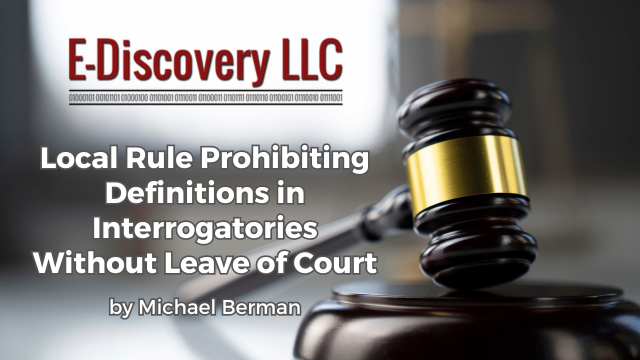
[EDRM Editor’s Note: The opinions and positions are those of Michael Berman.]
Payne v. Geer, 2025 WL 2061651 (D. Neb. Jul. 23, 2025), involved allegations of malicious prosecution. The court cited a local rule that prohibits use of definitions in interrogatories without leave of court.
[T]his Court’s local rules explicitly prohibit definitions without the Court’s leave. NECivR. 33.1(b) (“A party may not separately define words used in an interrogatory without the court’s leave.”). Plaintiff did not have leave of Court to use definitions.
Payne v. Geer, 2025 WL 2061651 (D. Neb. Jul. 23, 2025) (emphasis added).
Plaintiff Payne moved to compel discovery from Defendant Herman. In pertinent part, Herman objected to the definitions in Payne’s interrogatories. The Payne court wrote:
[T]his Court’s local rules explicitly prohibit definitions without the Court’s leave. NECivR. 33.1(b) (“A party may not separately define words used in an interrogatory without the court’s leave.”). Plaintiff did not have leave of Court to use definitions. Accordingly, the Court denies Plaintiff’s motion to compel on this issue. [Emphasis added].
Payne v. Geer, 2025 WL 2061651 (D. Neb. Jul. 23, 2025).
That is an interesting approach that I have never seen before. NECivR 33.1 applies only to interrogatories. There is no similar limit in Nebraska Civil Rule 34.1 which applies to requests for production of documents.
In Appendix D to the Local Rules of the United States District Court for the District of Maryland, the Maryland Court takes a different approach.
The Maryland Court published “Guidelines for Uniform Instructions and Definitions for Use in Discovery Requests.” It wrote:
These Guidelines set forth the full text of instructions and definitions for Interrogatories and Requests for Production of Documents. Parties may use any instructions, definitions, or rules of construction that are consistent with the Federal Rules of Civil Procedure. This Court has stated that the use of reasonable definitions may be helpful. Diversified Products Corp. v. Sports Center Co., 42 F.R.D. 3, 4 (D. Md. 1967). This Court has also stated that unreasonable definitions may render interrogatories so burdensome that objections to the entire series should be sustained, with sanctions. Id. “[L]awyers customarily serve requests that are far broader, more redundant and burdensome than necessary to obtain sufficient facts to enable them to resolve the case through motion, settlement or trial.” Mancia v. Mayflower Textile Servs. Co., 253 F.R.D. 354, 358 (D. Md. 2008).
Guidelines for Uniform Instructions and Definitions for Use in Discovery Requests.
For example, one uniform Maryland definition is:
Document: The terms “document” and “documents” are defined to be synonymous in meaning and equal in scope to the term “items” in Fed. R. Civ. P. 34(a)(1) and include(s), but is not limited to, electronically stored information. The terms “writings,” “recordings,” and “photographs” are defined to be synonymous in meaning and equal in scope to the usage of those terms in Fed. R. Evid. 1001. A draft or non-identical copy is a separate document within the meaning of the term “document.”
Another is:
Identify (with respect to documents): When referring to documents, to “identify” means to state the: (i) type of document; (ii) general subject matter; (iii) date of the document; and, (iv) author(s), addressee(s), and recipient(s) or, alternatively, to produce the document.
Both approaches seem focused on the same goal – avoiding unreasonable, lengthy, convoluted definitions to discovery requests.
In Diversified Products, the Court wrote: “The use of definitions is not prohibited by the Federal Rules of Civil Procedure.” 42 F.R.D. at *4. It set out two principles:
- “Prefacing a long series of interrogatories by reasonable definitions may be helpful, avoiding tedious repetition.”
- “But the use of unreasonable ‘definitions’ may render the interrogatories so burdensome to the answering party and to the Court, that objections to the entire series should be sustained with sanctions, whether or not an occasional interrogatory might be reasonable.”
In the interests of full disclosure, I served on a Bar Committee that helped draft the proposed Appendix to the Local Rules. Some other courts have taken a similar approach.
For example, Local Civil Rule 26.3 of the Southern and Eastern Districts of New York does not preclude definitions of terms specific to the litigation – something that would require leave of court in Nebraska – and it provides a series of definitions applicable to all requests.
Massachusetts Superior Court Rule 30A is similar, stating: “The full text of the definitions set forth in paragraph (l)(c) is deemed incorporated by reference into all discovery requests, but shall not preclude (i) the definition of other terms specific to the particular litigation; (ii) the use of abbreviations; or (iii) a narrower definition of a term defined in paragraph (1)(c).”
Prof. Richard L. Marcus wrote in §2168 of Wright & Miller, ‘Federal Practice & Procedure Civil (3d ed.): “There is no prohibition against the use of definitions in interrogatories, and definitions may be helpful in clarifying the meaning of obscure terms or avoiding repetitions in a long set of interrogatories.”
The use of definitions is not prohibited by the Federal Rules of Civil Procedure.
Diversified Products Corp. v. Sports Center Co., 42 F.R.D. at *4 (D. Md. 1967).
He added, quoting Pressley v. Boehlke, 33 F.R.D. 316, 317 (W.D.N.C. 1963), that the Rules have a ”built-in penalty”:
One reason Rule 33 works so well in practice is that vague and argumentative questions usually contain a built–in penalty. Evasive or cryptic answers are ordinarily insufficient. * * * But a cryptic question invites an inscrutable answer. It is said colloquially, “Ask me a foolish question, and I’ll give you a foolish answer.”
Prof. Richard L. Marcus in §2168 of Wright & Miller, Federal Practice & Procedure Civil (3d ed.).
It has also been suggested that:
The applicable standard of reasonable clarity and definitiveness in the form of interrogatories may require definitions of certain terms used, but the standard may be met without providing definitions of terms.
22B Am. Jur. 2d Depositions and Discovery § 125.
How does the Nebraska local rule work? Other than Payne, I found only one example. Union Pac. R. Co. v. U.S. Dep’t of Homeland Sec., 2011 WL 532301, at *1 (D. Neb. Feb. 8, 2011).
The Union Pacific court wrote: “The defendants seek leave, pursuant to NECivR 33.1(b), to separately define nineteen terms to be used in their interrogatories…. The defendants argue separate definitions are necessary given the technical nature of the issues.” Defendants argued that the definitions would add clarity.
The Union Pacific court explained that plaintiffs responded that defendants had not shown a “compelling rationale for allowing the proposed definitions,” and raised a panoply of objections. The specifically objected to the definitions used for the terms “explain,” “document,” and “facilities.”
In that case, the defendants replied that the objections were premature and that most of them lacked specificity.
The court finds the plaintiff has failed to show good cause for precluding the use of the proposed definitions. In contrast, the defendants have shown substantial justification for serving separate definitions with their interrogatories.
Union Pac. R. Co. v. U.S. Dep’t of Homeland Sec., 2011 WL 532301, at *1 (D. Neb. Feb. 8, 2011).
The Union Pacific court wrote:
The court finds the plaintiff has failed to show good cause for precluding the use of the proposed definitions. In contrast, the defendants have shown substantial justification for serving separate definitions with their interrogatories. The defendants’ proposed definitions will likely avoid tedious repetition and are reasonable in light of the complexity of the case. The definitions themselves do not expand the scope of discovery beyond the limits imposed by the Federal Rules of Civil Procedure. Further, in allowing the use of separate definitions the court does not determine whether any particular interrogatory is objectionable.
Union Pac. R. Co. v. U.S. Dep’t of Homeland Sec., 2011 WL 532301, at *1 (D. Neb. Feb. 8, 2011).
Undoubtedly, definitions have been abused. On the other hand, definitions have been successfully used and may have value. The scope of discovery, reasonableness, and proportionality would appear to be the lodestar.
Assisted by GAI and LLM Technologies per EDRM GAI and LLM Policy.


